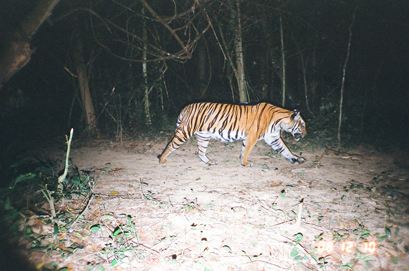New Delhi, India, 15 May, 2012 – Tiger range countries in their first meeting to review efforts on doubling the number of wild tigers by 2022, reported significant progress, but recognized that urgent and elevated action is still needed to halt poaching.
“Steady progress is being made towards meeting the goal of doubling wild tiger numbers,” said Mike Baltzer, Leader of WWF’s Tigers Alive Initiative. “But tiger range governments must urgently and seriously step up action to eliminate poaching if they do not want their investments to go to waste.”
In November 2010 at the “Tiger Summit” in St. Petersburg hosted by the Government of Russia and the World Bank, the 13 Tiger Range Governments and partners committed to doubling the number of wild tigers by 2022 (TX2). They presented the Global Tiger Recovery Program (GTRP), which represents the plans towards meeting this goal.
The meeting in New Delhi, held from 15-17 May 2012, was the first time since the Tiger Summit that senior government officials from all 13 countries have met to review progress on implementation of the GTRP and plan the next steps.
Before the meeting, WWF released results of a preliminary assessment of 63 legally protected areas in seven tiger range countries that showed only 22, or 35%, maintain WWF’s minimum standards of protection. This indicated that tigers in most of the protected areas are still very vulnerable to poaching.
Poaching of tigers, to feed consumer demand for their body parts and products, is now the main factor reversing the gains made by governments, donors and other partners working towards the 2022 goal. Nearly all tiger range countries spoke of the poaching problem and efforts they are taking on the ground to tackle it. These include strengthening capacity and introducing new, innovative law enforcement monitoring tools, such as M-STrIPES and SMART, to better manage protected areas with tigers. They also considered new approaches to reduce consumer demand for tiger derivatives.
“We are pleased that the approaches we recommended on demand reduction are being considered to support implementation of the GTRP,” said Sabri Zain, Director of Advocacy and Campaigns, TRAFFIC International. “It is critical that we implement new approaches to changing consumer behaviour if we are to successfully stem out poaching in the long run and therefore in achieving TX2.”
During the meeting, TRAFFIC also presented new figures from its latest research into the rising number of tiger part seizures taking place in Asia. With 53 seizures occurring each year, levels remain high. The analysis also identified persistent tiger trade hot-spots such as Kathmandu, Hanoi and the Russia/Northeast China border. It is essential that a tiger trade monitoring system be established as information such as this can assist enforcement efforts in the field where it is most needed.
In a sign indicating tiger range countries are increasingly working together to save the tiger across their borders, the meeting witnessed the signing of a bilateral agreement on trans-border cooperation between India and Nepal and another between India and Russia.
”This gathering of tiger range states shows that the momentum to save tigers is indeed building, but the pressure on the species continues,” said Ravi Singh, Secretary-General and CEO, WWF-India. “Coordinated anti-poaching measures across tiger range states are called for. These need to be scaled up and implemented urgently to achieve zero poaching.”
WWF is supporting tiger range countries in their enforcement efforts through both training and helping to develop computer-based, law enforcement monitoring systems. It has also identified three actions tiger range governments can take immediately to launch an elevated operation towards Zero Poaching. These include identifying and delineating the most important sites requiring good protection from poaching, and ensuring these sites have sufficient numbers of enforcement staff who are well trained to monitor and improve their effectiveness by using monitoring systems. WWF also suggests that the police and judiciary need to help to ensure strict punishment on poaching and to actively engage local communities living adjacent to important tiger conservation areas.
For further information:
Ua-phan Chamnan-ua, uchamnanua@wwfgreatermekong, +668 1928 2426
About WWF
WWF is one of the world’s largest and most respected independent conservation organizations, with over 5 million supporters and a global network active in over 100 countries. WWF’s mission is to stop the degradation of the Earth’s natural environment and to build a future in which humans live in harmony with nature, by conserving the world’s biological diversity, ensuring that the use of renewable natural resources is sustainable, and promoting the reduction of pollution and wasteful consumption
About TRAFFIC
TRAFFIC, the wildlife trade monitoring network, is a joint programme of WWF, the global conservation organization and IUCN, the International Union for the Conservation of Nature. TRAFFIC currently works on wildlife trade issues in over 25 countries and territories, with ongoing research and activities in several others. In India, TRAFFIC functions as a division of WWF-India. TRAFFIC India works to ensure that trade in wild plants and animals is not a threat to the conservation of nature in India. For more information please visit http://www.trafficindia.org www.traffic.org or www.trafficindia.org














